This gorgeous medieval RPG continues to be just as divisive, prickly and abrasive as its predecessor.
Direct sequels in games are funny things, aren’t they? As narrative contrivances go for honouring all the choices you made and characters you built in the first part of the story, there are usually two schools of thought on how to keep building on that foundation effectively. One is the Star Wars Jedi: Survivor route, where developers rummage even deeper into their bag of tricks and somehow emerge with even wilder skills and abilities that make the first game’s power curve look like training wheels.
Kingdom Come: Deliverance 2 review
But then you get games like Kingdom Come: Deliverance 2, which strip their heroes right down to their pants and have them flee for their lives into the hills. I mean that quite literally here. Picking up immediately after the events of the first game, blacksmith-turned-squire Henry and his idiot lord-in-chief Hans Capon have trotted off to Trosky to broker peace with the enemies of King Wenceslaus. Alas, your trumpeted arrival is cut short when Capon’s lusty appetites get the better of him and he goes swimming in the nearby pond to chase some nearby giggling women. Unfortunately for the rest of their travelling party, this is the exact moment a band of local bandits decides to attack and murder everyone, causing Henry and Capon to flee with nothing but their soggy bottoms intact.
A daft and cringeworthy setup in equal measure, but it nevertheless does an effective job of doubling the stakes for this sequel. Not only are you in hostile and unfamiliar territory here, but you’ve also got to claw back all the trust and status you lost so everything you worked for in the first game isn’t completely for naught. Strangely, though, the game doesn’t seem all that bothered about what those earlier events actually were most of the time. After picking one of three classes to determine your starting crop of strengths and perk points, Kingdom Come: Deliverance 2 effectively acts as a clean slate to what’s come before. Some of Henry’s previous escapades are occasionally referred to in passing when chatting idly with NPCs, but there’s no long-drawn character sheet building or decision porting like in Mass Effect or The Witcher, and your answers have little bearing on anything at all.
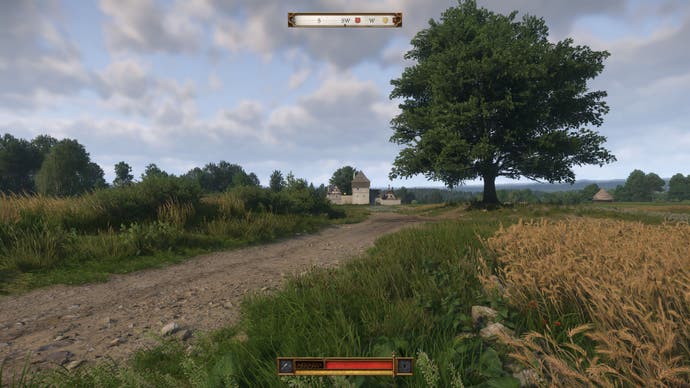
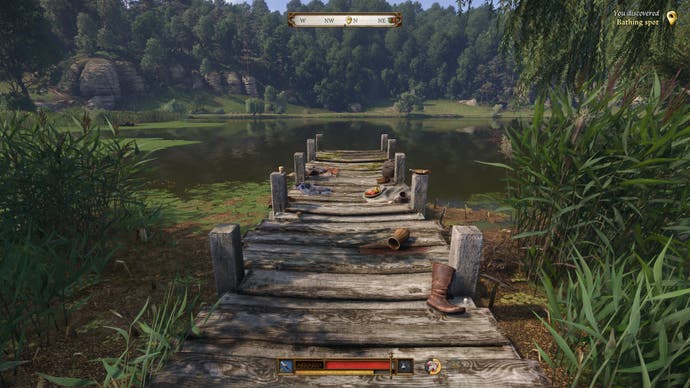
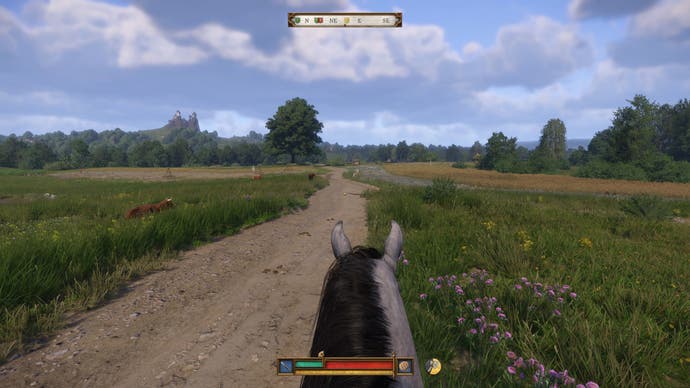
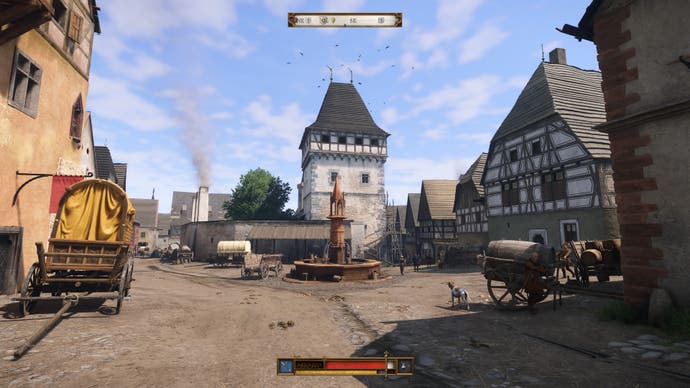
For new players, it’s refreshing not to have a whole game’s worth of baggage bearing down on you in these moments. Then again, with zero accompanying context on what any of these names and places mean, it can’t help but alienate at the same time, making you feel adrift in a sea of missing back story. Likewise, for returning players hoping for more of a throughline with their version of Henry, the throwaway nature of these moments may come across as something of a disappointment.
Still, for all the lumps and bumps in its plot, the meat of Kingdom Come: Deliverance 2 is still very much business as usual. This is an RPG that thrusts you out into the lush, green fields and forests of fifteenth century Bohemia, and leaves you to make of it what you will. Your skills improve slowly by doing them repeatedly over time, and careful attention must be paid to your appearance, cleanliness and attitude if you’re going to ingratiate yourself with the locals. It’s play-acting of the highest order, and exploiting Henry’s chameleon-like ability to become all things to (almost) all people forms the backbone of this dense and sprawling RPG experience.
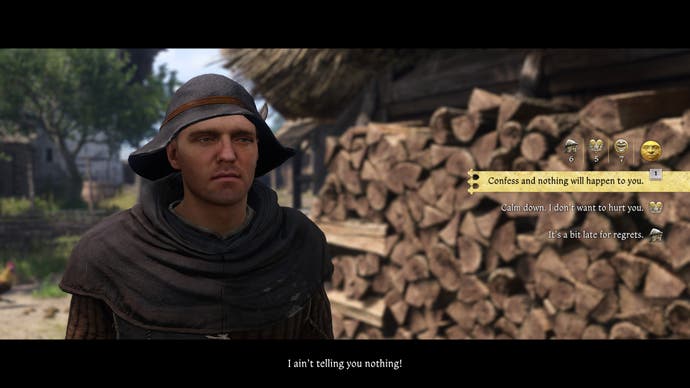
The main quest will take you on a tale of deceit and intrigue that only gets grander and more ambitious as it goes on, but the game’s huge stable of sidequests shouldn’t be overlooked. These are often just as substantial as those on the critical path, weaving complex tales across its two enormous playable regions where their lettered objective markers regularly reach down to the Ps and Qs. They are twisty, lengthy yarns that feel pleasingly elastic in how you’re able to approach them. Possibly not quite to the same extent as Baldur’s Gate 3, perhaps, but the way its reactive and accommodating script handles the cumulative snowballing effect of your actions gets pretty damn close.
Early on, for example, I undertook a series of exhaustive quests from the local miller to help me get into a high-profile wedding feast. When I managed to get to the wedding another way, leaving the miller’s quest unfinished, the game didn’t close off that avenue of the story, or automatically fail it. Instead, when I returned to the miller post-wedding, the script immediately bounced back and shifted gears to accurately reflect where I was in the story at that point, all without missing a beat. The same goes for when you stumble on important quest items unexpectedly ahead of time, or come to solutions slightly differently to how the quest might have intended.
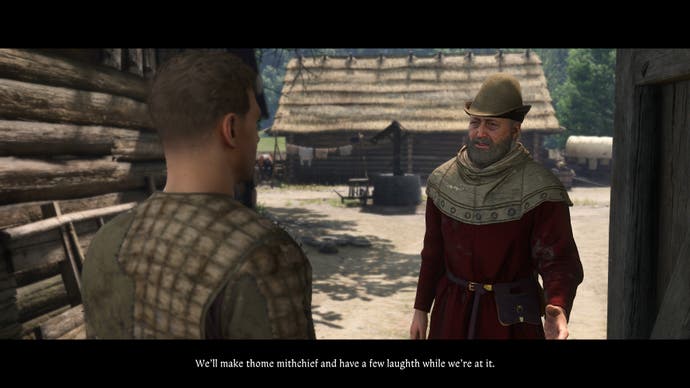
Sometimes that cleverness can fall flat, such as the time I decided to steal a supposedly magic amulet instead of winning it fair and square from its Romani owner. The recipient – the owner’s daughter – implied that theft was the only way forward, but on my return with the stolen amulet in hand, only then did she bemoan that its magic comes from being handed over willingly, so stealing it robbed it of all its power. In that moment, I felt annoyed and misled, and I left grumbling to myself how I should have just endured the slightly arduous-sounding, multi-stage wager challenge proposed by her mother instead. My fault for wanting to cut corners, perhaps, but a path I thought the game was pushing me down nevertheless.
Thankfully, the impact of these sorts of quests is fairly minor, but others are much more important, almost to the point of being practically essential if you’re ever truly going to get to grips with Kingdom Come: Deliverance 2’s many, and often very fiddly, systems. The way to that wedding feast, for example, is presented as an either/or optional choice between two multi-stage sidequests, the miller’s path teaching you the basics of stealth and thievery, while an alternate path sees you enter the employ of another blacksmith who takes you through crafting and other vital survival skills such as hunting and tracking with a dash of combat. That you could feasibly miss either of these quest paths in the ten or so hours it takes you to even step foot in the wedding is woefully ill-conceived, though its tutorialising methods more generally do leave a lot to be desired elsewhere.
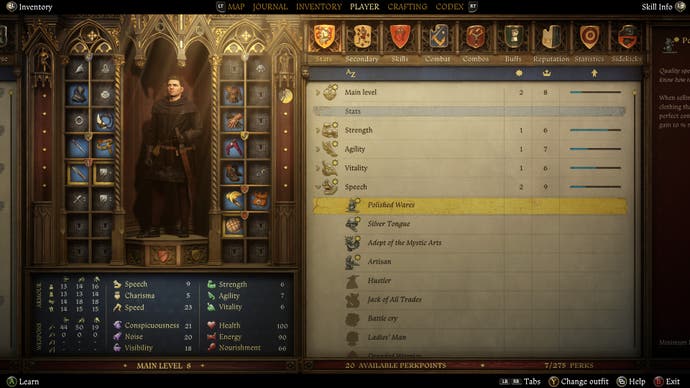
Rather than teach you its systems by showing, Kingdom Come: Deliverance 2 relies on telling you via a bevy of dense text menus – some of which are no more enlightening by the time you’ve finished reading them than you were at the start. You can, at least, refer back to them at any time should you need a refresher, but that still doesn’t excuse its poor explanation of how dice match turns work, for example, or the hours it took just to figure out how to equip my damn torch properly when night falls.
Even if you do feel like you’ve got your arms around a particular system, there’s still a lot that’s left to chance through various skill checks. Of course, rolling invisible dice on trying to be knowledgeable, intimidating, domineering or simply winning people over with your charming and charismatic personality is all part and parcel of an RPG like this, and there’s a genuine thrill in seeing if you’re successful. Heck, even when responses don’t go your way, there’s surprising wit and humour to be found in its script that usually helps soften the blow of defeat.
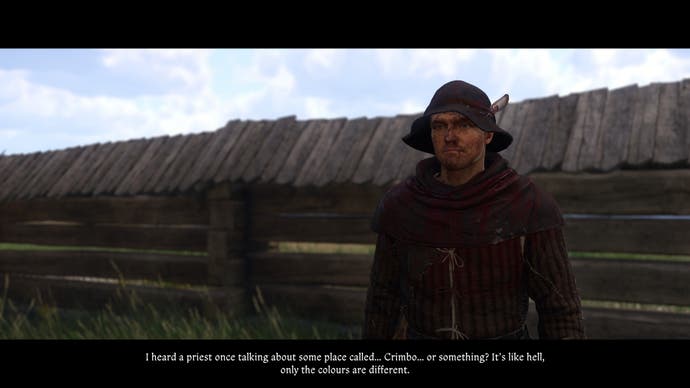
But when multiple skill checks are in play during any one dialogue option, I do wish there was just a smidge more information available to interpret what its various numbers actually mean. Is 8 Speech better than 4 Dread or 2 Charisma, for example? Not always, it turns out, as your overall persuasion stat is governed by several other interlocking stats and skills, the effects of which are sometimes hard to grasp in any given moment. Other factors are even subtler – such as having the wherewithal to take notice of your opponent’s social standing, say, and weighing it up silently in your head against your own. Cynically, it all feels a bit like nebulous guesswork, though again, perhaps this is more a symptom of trying to game the system than truly meet it on its own terms. I have no doubt that these silent, unknowable mind games will be deeply enjoyable for some, but it’s also the exact same recipe that’s likely to cause frustration in others.
It doesn’t help that throughout the early stages of the game, your stats often aren’t good enough to succeed at literally anything. You are constantly failing left, right and centre, and only over time, through repeated head butts against the wall of progression, do you gradually, finally, gain the smallest of footholds. To say it’s a grind isn’t quite accurate, but it does take considerable effort and determination to muster the will to continue sometimes. This friction won’t be for everyone, and deciding whether you’re able to embrace that tension will ultimately make or break the game for you, I think. I’m right on the edge of this particular fence myself – at a slower, less hurried pace than the handful of weeks we’ve been afforded for review this time round, I reckon there’s a version of me that actually quite likes this more abrasive style of RPG. There aren’t many games that push back on the player as much as Kingdom Come does, and I do admire that about it.
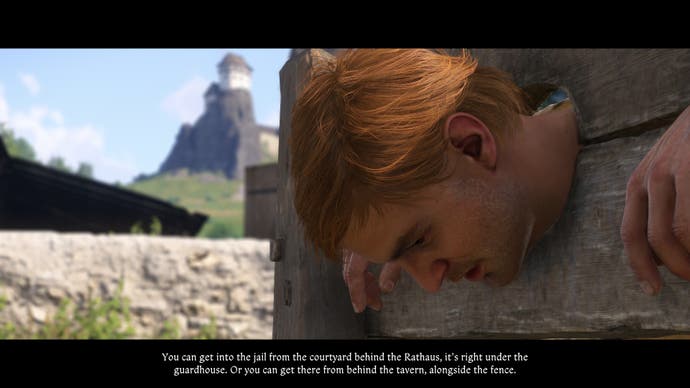
There is much to be said about how hands off it is. While your ultimate destinations are always marked up clearly on your map and compass bar, I love that you really have to look and listen to what characters are saying to discern a mission’s finer details or seek out particular objects. This is a game without detective vision or licks of yellow paint everywhere, and it’s refreshing to pay such close attention to its gorgeous and detailed world. It shows that both exterior and interior spaces can still have distinct visual identities without needing to flag things up with not-so-subtle signposts all the time, and the result is a level of immersion that few other action RPGs are able to match. There is so much to see and do here, and it’s the kind of game that should be savoured over many, many months.
That said, no amount of time will ever make the interminably bad hang that is Hans Capon any more palatable to me. This boarish buffoon almost pips Goldeneye’s Natalya as the companion I want most to see roast in the fires of eternal damnation, and he is easily the game at its most detestable – a lewd shrimp of a public-school posh boy whose childish, throw-his-toys-out-the-pram approach to any kind of obstacle made me wish I could stick him with the pointy end as soon as possible (or let him hang when given the chance), just like I could with its rest of its murderable cast. But you’re stuck with this turd of a human for the long haul unfortunately, which put as much strain on my will to carry on as the game’s obtuse stat systems.
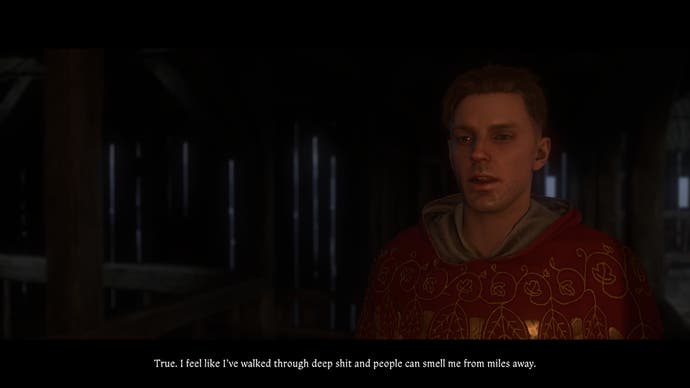
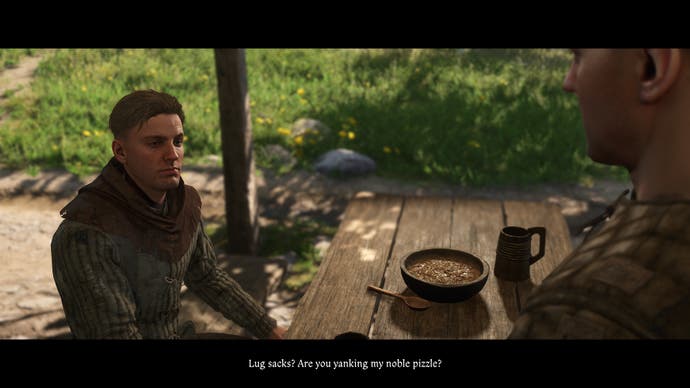
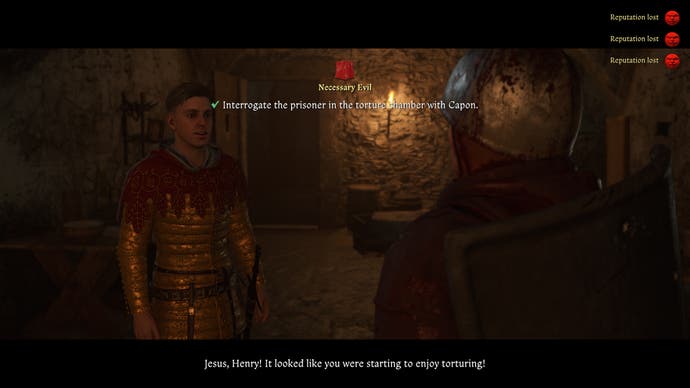
It’s not helped by cutscenes that verge on Kojima levels of indulgence in places, with several scenes feeling bloated and overwritten. I often felt myself reaching for my phone to help drive away the boredom in these moments, especially during the long stretches of horse-back riding where control is wrested away from you completely, leaving you to passively follow along for minutes at a time while fending off hailstones of exposition. Even fast travel stretches the meaning of the word, as you wait patiently for your little model of Henry to toddle across the criss-crossing roads of its impressionistic map before finally arriving at your destination – though you’re just as likely be interrupted halfway through by an event of some kind (usually wolves or bandits lying in wait to clobber you rather than anything more inviting), making it feel more cumbersome than it needs to be.
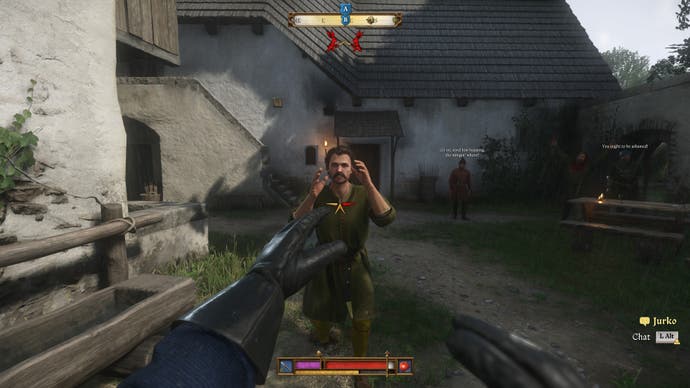
Thing is, these innocuous encounters aren’t just extraneous time wasters. They’re real and frustrating dangers, as just like the first Kingdom Come, this game is exceedingly stingy with its saves and checkpointing. You’re just as likely to die to a random wolf in this game as you are in a full-blown army ambush, potentially undoing hours of painstaking work if you haven’t slept in a while or are part-way through a mission quest. It’s mean-spirited in the extreme, especially when the combat system remains one of the worst tools available to you to try and defend yourself with.
Like before, an easily worn-down stamina bar governs the limits of your physical abilities in any given fight, turning most scraps into slow, comical dances of swings and recuperating roundabouts. But many of the weapon choices here feel quite limp and lacking in heft a lot of time. Close-quarters fights are just about serviceable, despite its somewhat messy and undercooked directional system of being able to strike to either side, the head or the gut, but ranged combat feels utterly weightless. Bows and arrows flit through the air like out of breath pea shooters, and the new rifle-like hand pistols take such an age to reload (and explode in such obfuscating puffs of smoke when fired) that they’re next to useless. All this is compounded by a stubborn lock-on that still doesn’t want you to easily turn around to fend off multiple nipping fangs or incoming maces.
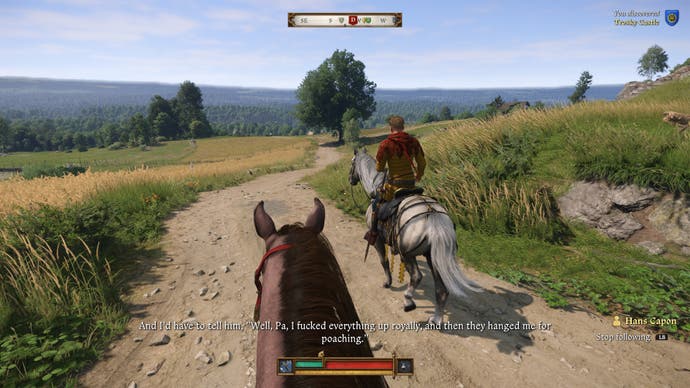
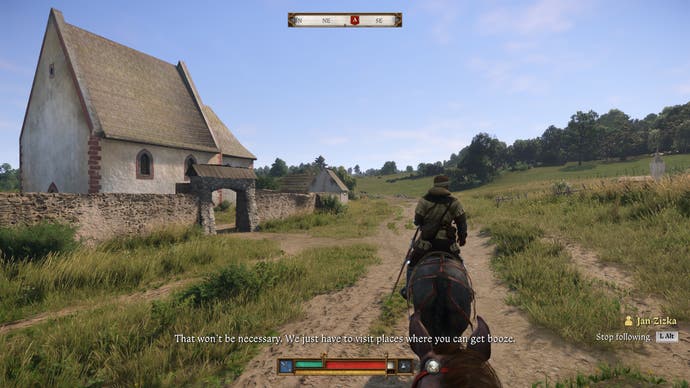
Instead, I found myself relying on the old shield parry and riposte most of the time, as you would do well to master, too, given how much more prevalent fights are across almost all questline types (and if you’re not having to fight someone, there’s good change you’re stealing something instead, or hauling some kind of sack (coal, human, animal or otherwise, they’ve got ’em all here). It’s disappointing how often these three activities repeat themselves in Kingdom Come: Deliverance 2, especially when there’s such a wealth of other pursuits to potentially draw from – smithing, hunting, alchemy and herb gathering to name just a few of them.
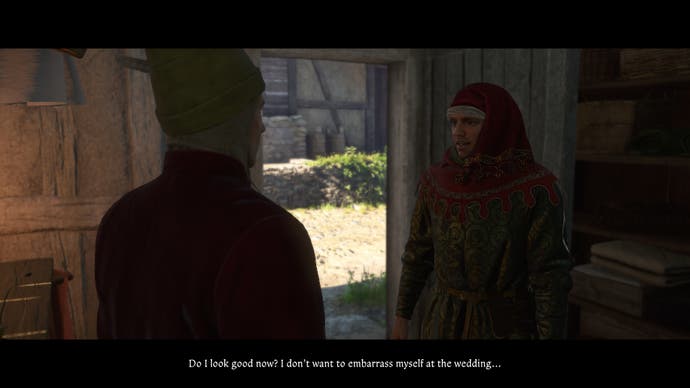
Kingdom Come: Deliverance 2 accessibility options
Subtitle size and contrast options. On/off toggle for motion blur and near depth of field. Separate volume sliders for in-game music, sound and main music. Key/controller bindings. On/off toggle for controller vibration, immersive trigger effect, Dualsense adaptive triggers and light bar. Sliders for mouse look sensitivity and left/right stick dead zone.
Admittedly, there are still moments of levity to be found among the drudge work, such as the blind priest who tasked me with building pyramids of bones in a messy crypt, or thieving a maypole from a rival village to deepen a generations-long spat between them. A drunken game keeper insists you’re his horse at one point, and a shift with jolly graveyard digger ends in him asking you to make some corpses of your own to facilitate a dodgy agreement he came to with his neighbours. It’s still a little too eager to jump into more juvenile territory when women enter the picture, especially when Hans is around, but at least its romance buffs are a little more tastefully named this time round. Though thanks to its infuriating system of multiple menu panels in a single screen, you’d be hard pressed to even find them most of the time (and that’s assuming you don’t just give up in anguish). It shouldn’t be this hard to move between important stat info and equipment menus, but somehow it is, and it’s one of many, small frustrations in Kingdom Come: Deliverance 2 that can’t help but wear you down over time.
There are many times I wish Kingdom Come: Deliverance 2 was easier to like. Easier to get into, easier to enjoy, and easier to savour in the long-run – and that’s before we get into the knotty briar patch of its director being a vocal supporter of a movement whose effects continue to cause real and tangible harm to the wider industry. But I also don’t think it really cares about being liked, either. Which is fine, as I don’t really much like it myself. There’s a lot to admire here, sure, but you have to do so on its own terms. It is a hard and maddening slog at times, but one that still has its moments where it surprises and quietly delights. Like the original, this isn’t an RPG designed to make you feel good – you continue to be little more than a passenger in this historical tapestry, following along behind the horse tails of Henry’s betters, and clearing up the mess they leave behind. Some will revel in that work, but I for one won’t be chomping at the bit for another sequel any time soon.
A copy of Kingdom Come: Deliverance 2 was provided for review by publisher Deep Silver.
fbq('init', '560747571485047');
fbq('track', 'PageView'); window.facebookPixelsDone = true;
window.dispatchEvent(new Event('BrockmanFacebookPixelsEnabled')); }
window.addEventListener('BrockmanTargetingCookiesAllowed', appendFacebookPixels);
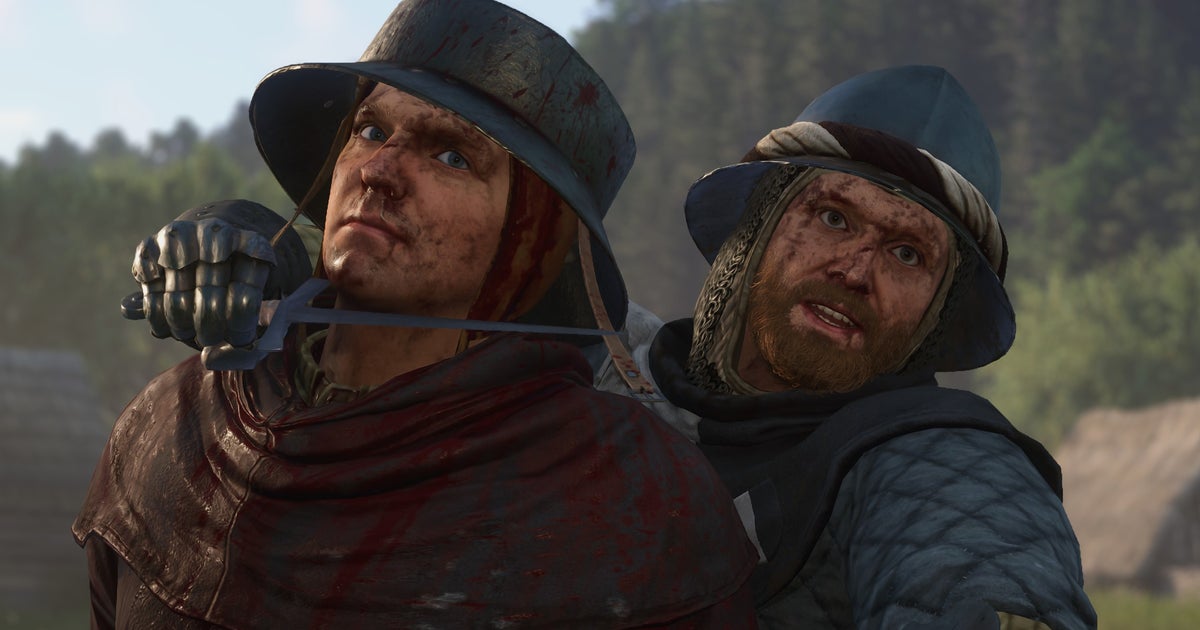
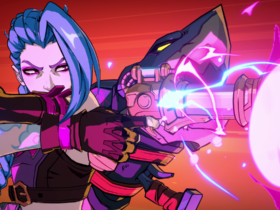

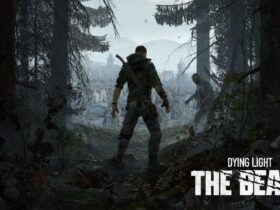



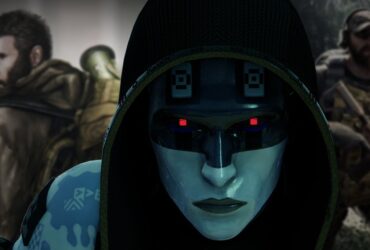



Leave a Reply